I know only wisps of my grandmother’s life, those parts that came to me in stories told by my mother, or from the occasional times our family made the 3,000 mile trip from Southern California to the Virginia farm where she spent 64 years, her entire adult life.
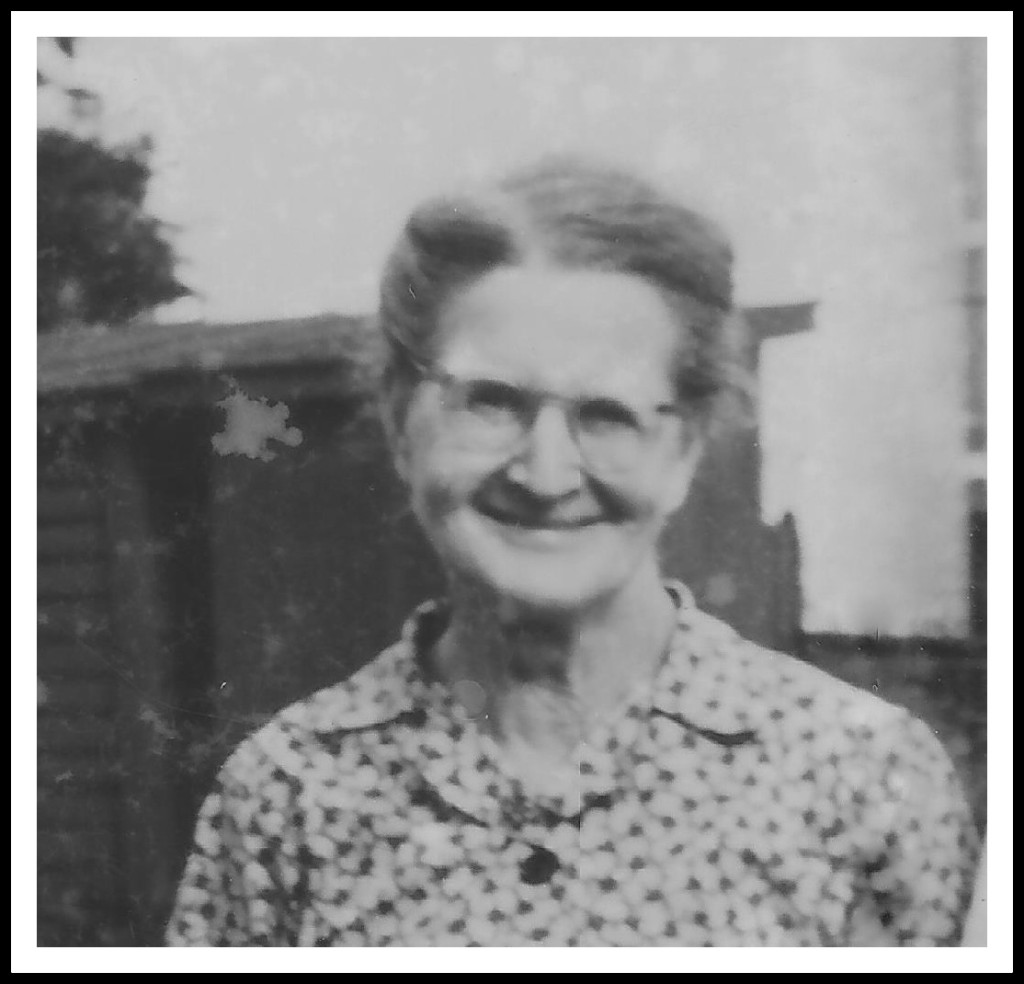 I know she was a gentle woman with a sweet smile who spoke quietly and was of few words. She was not effusive with her emotions, but through her actions made it clear to her family that they were loved and to her guests that they were welcome.
I know she was a gentle woman with a sweet smile who spoke quietly and was of few words. She was not effusive with her emotions, but through her actions made it clear to her family that they were loved and to her guests that they were welcome.
To her, a bountiful table and a clean home were signs of love, not duty, and in these acts she never faltered. Big country breakfasts and Sunday chicken dinners could be counted on. So could Saturday chores and Sunday church, all of which gave her family a sense of order and stability that allowed them to flourish within those boundaries. She was the hub of the family with her quiet strength, and all were devoted to her.
Florence Elizabeth Collier was born on a cold winter day in the Blue Ridge Mountains of Virginia, just up the ridge from Jollett Hollow, on the edge of the Shenandoah Valley. She was the daughter of Mary Margaret Magdalene Meadows Collier and William Durrett Collier, both of whom were also children of those mountains. It is likely that their home was hewn of rough wood, the gaps filled with clay mud and stones, and with packed dirt floors, as were many mountain homes in the early 1900s. The family had a large fruit orchard, fields they farmed, and nearly 500 acres of woodland from which they harvested chestnut tanbark in the spring.
Her mother was known as a healer, and used potions of mountain herbs to treat the patients who came to her for care. I’ve been told by people who knew Mary that mothers brought their babies to her when they suffered with thrush, believing that her breath, blown into the baby’s mouth, could heal the child. This was a gift believed to be bestowed on those who never met their fathers, as Mary was.
Florence did not attend school past the first few years, telling her mother that learning to read and write scared her, and she did not want that power. She preferred to stay at home, working in the fields and garden instead, helping her mother, preparing for the life of a farm wife. The work was hard, but she was undaunted. As a teen, full of life and promise, she “hoed all day and danced all night,” to use the phrase she told my mother years later.
I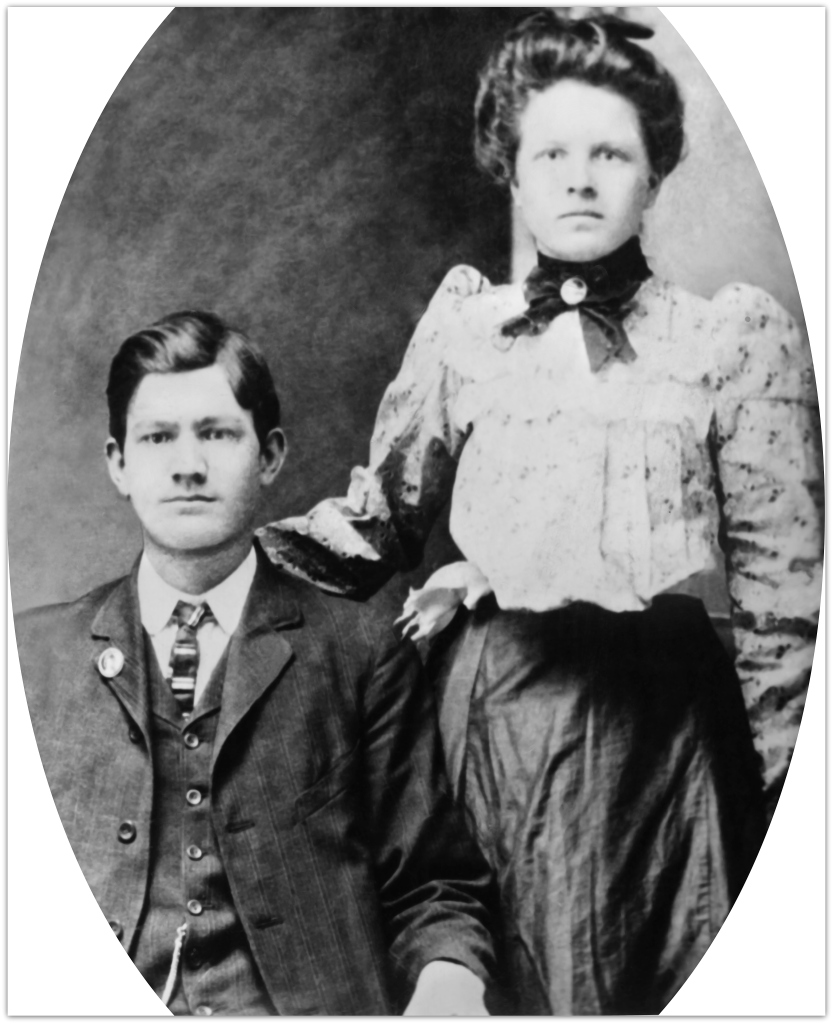 t was no doubt at one of the area’s frequent barn dances that she met her future husband, Thomas Austin Merica. She was 17 when they married, and so small around that her young husband, tall and strong, could put his hands around her waist, making her blush with secret delight. That delight never left, and even years later her cheeks flushed when her husband spoke affectionately to her, especially when he called her Sally, a pet name.
t was no doubt at one of the area’s frequent barn dances that she met her future husband, Thomas Austin Merica. She was 17 when they married, and so small around that her young husband, tall and strong, could put his hands around her waist, making her blush with secret delight. That delight never left, and even years later her cheeks flushed when her husband spoke affectionately to her, especially when he called her Sally, a pet name.
One evening when my mother, then a teen, was getting ready for a date, she heard her father say to her mother, “They go somewhere and park.” Florence answered, “We were young once.” On another occasion Tom told his beautiful teenage daughters, Ruth and Annie, that neither one was as pretty as their mother. Far from being hurt, the girls were delighted at his love and loyalty.
A photo of my grandmother as a young woman of 22 shows that she was indeed a beauty. Her features are delicate and well-proportioned, and though there is no trace of a smile in the photo, there is tenderness in her full lips, and in the ever-so-slight tilt of her head. A great pile of brown hair is twirled loosely atop her head, 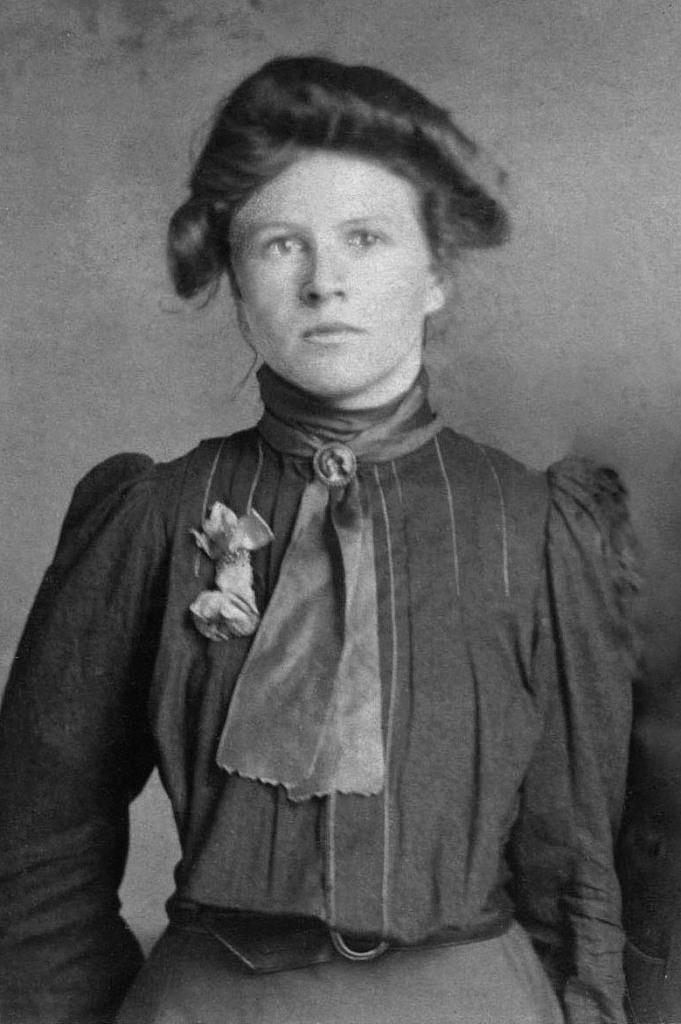 wisps falling about her neck and ears. The story goes that her thick chestnut hair fell below her waist until a bout with pneumonia thinned it.
wisps falling about her neck and ears. The story goes that her thick chestnut hair fell below her waist until a bout with pneumonia thinned it.
Her high-necked blouse, pleated at the breast and cinched tightly at the waist, is that of a plain and modest woman, as I know she was. The blouse appears to be of the same pattern as the one she wore in her wedding photo, and she no doubt made them both. In this picture a ribbon is wound several times around her neck and clasped with a round cameo broach, perhaps the same one as in her wedding photo. I wonder what ever became of that broach.
She was close to her sisters and her mother, and visited them regularly. Sometimes on a Sunday she asked her son Jesse to drive her and the younger children to visit her mother at her home on Naked Creek in Jollett Hollow, where Durrett and Mary moved after the government bought their former farm to make way for Shenandoah National Park.
Jesse hooked up the big horse, Pet, to the wagon, and off they’d go on the seven mile journey, stopping at the Meadows store on the way to buy mackerel, which Mary would cook up into fried cakes for lunch. Sometimes Mary’s other daughters came visiting too, and the mother and sisters, Florence, Annie, Emma, and Minnie, would talk the afternoon away while the children played by the creek.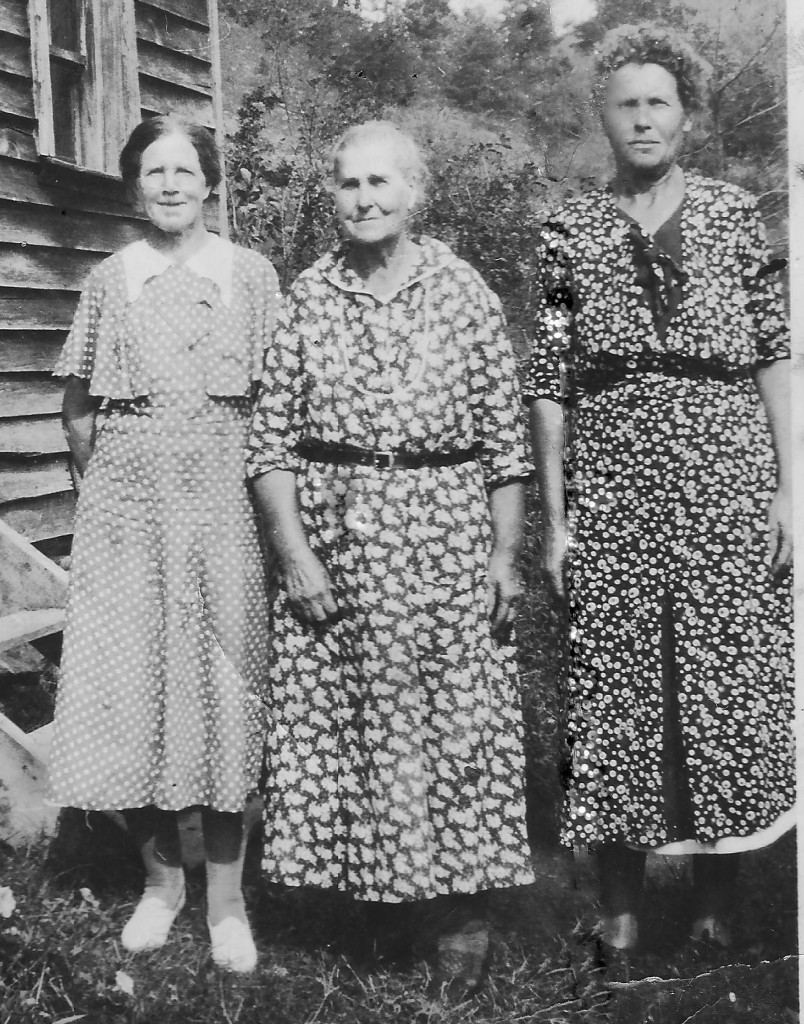
Once the family got a car, a sturdy Model T Ford, Jesse would also drive his mother and sisters to visit Emma, who lived in Newport News, 175 miles away. Tom seldom made the journey.
The introduction of the automobile was an exciting event for Florence. Unlike some local people she was not afraid of riding in cars. My mother tells the story that Uncle Hunter, Tom’s brother, drove Florence and some other women up Grindstone Mountain to pick berries. On the way down the car began to go faster, frightening the other women to where they jumped out. Florence came home and laughed about the event with her family.
Maybe it’s not love that I feel so much as longing for my grandmother. Longing to know this woman whose blood runs in my veins, this woman who gave birth to my mother, who in turn gave life to me. When I was younger I was too busy to think about her. She was many miles and another world away. Now, 45 years after I watched my grandmother breath her last breath in her own home on a snowy winter night, her family around her, have I come to sense what a loss it was not to know her better.
She died in the same Virginia farmhouse where she spent her entire adult life; the farmhouse where she lost twins shortly after birth, but raised eight children to adulthood. Where she grew roses along the white picket fence and lilacs outside the parlor window, a big kitchen garden and orchards in the back. Where she cooked on a wood stove and did her business in an outhouse until her death in 1969, never having seen the point of modern technologies.
Where she fried dried apple turnovers for her children, baked coconut cake for Christmas, sewed quilts to keep her family warm, cooked enormous meals for the men who came to help at harvest time, listened to the Grand Ole Opry on the parlor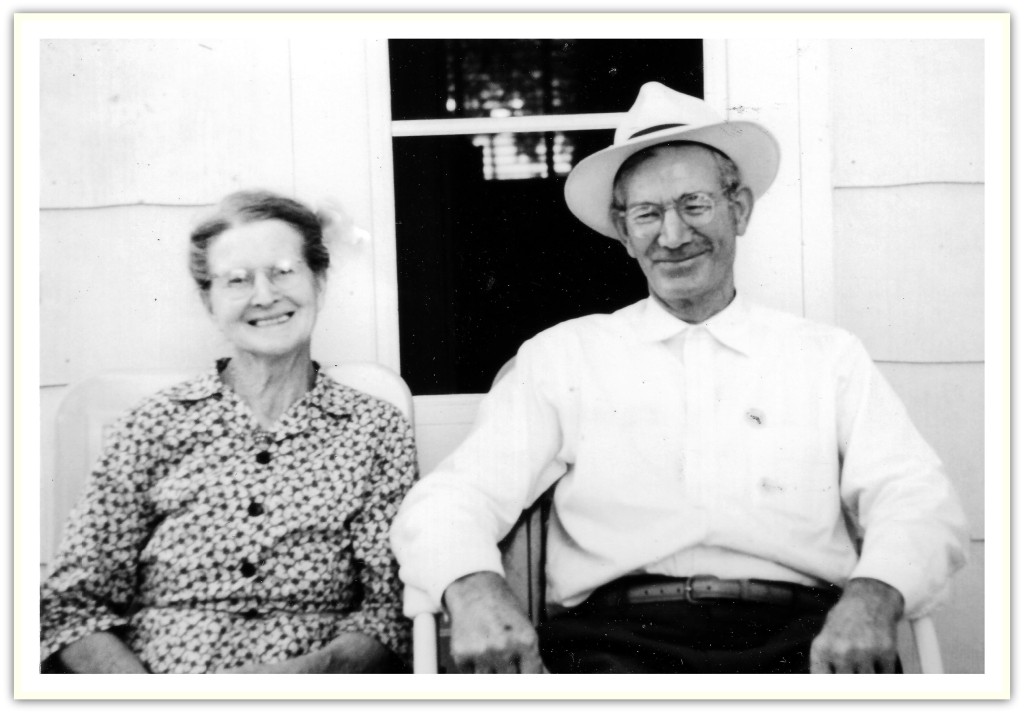 radio, and lived a just and satisfying life, relatively free of drama or pain.
radio, and lived a just and satisfying life, relatively free of drama or pain.
I wish I could say more about my grandmother, but these are the only memories, and the only bits of knowledge passed to me by my mother, that I have. They will have to do.

What a thoughtful and interesting story about your grandmother. Loved it!
Thank you, Linda. It was hard to write because I had so little I could say about her. I appreciate your comment.
Your title caught my eye as I never really knew my grandmother but through the stories and food recipes shared with me, I began to felt as if I did know her. You wrote a beautiful story pulling it all together to form her story.
Thank you for your comment, and for reading.
Pingback: Recommended Reads | Empty Branches on the Family Tree
Thank you for the recommendation.
I was blessed to hear a few story’s from my grandmother Grace Gordon daughter to Lillian jollett about her grandfather John b Jollett son of the rev ,he was a carpenter and is laid in a Baltimore cemetery unmarked ,if the means every afforded me I would bring him home to rest in peace with his father and mother.your story was very touching.guy snyder
Thank you for your kind comment. I hope you are able to accomplish your goal of bringing your ancestor home to Jollett Hollow.
The absence of dates and records really diminishes your work. In order to tell the real story, you must reconcile dates and places. And names. Several of the stories you tell are not supported by the public records. There is a place for family stories. They are rich and valuable. But representing family stories as genealogy is just a shame. The truth is in the records. I hope you’ll decide to check some of these stories against the public records so that you can discover how your ancestors truly lived, cousin. Best wishes, Nancy
A bit harsh, don’t you think? If “several of my stories” have incorrect information, why not tell me what is incorrect so I can double check records, instead of simply criticizing the veracity of my writing and attempting to cast a shadow of “shame” over them? A simple correction of any incorrect facts would have been both helpful and appreciated. Instead, you chose only to criticize,…cousin.